Demolition Contractors Fort Wright
Top Demolition Services in Fort Wright
Get up to 3 Demolition Experts quotes for your project today! Compare profiles, reviews, accreditations, portfolio, etc... and choose the best service.
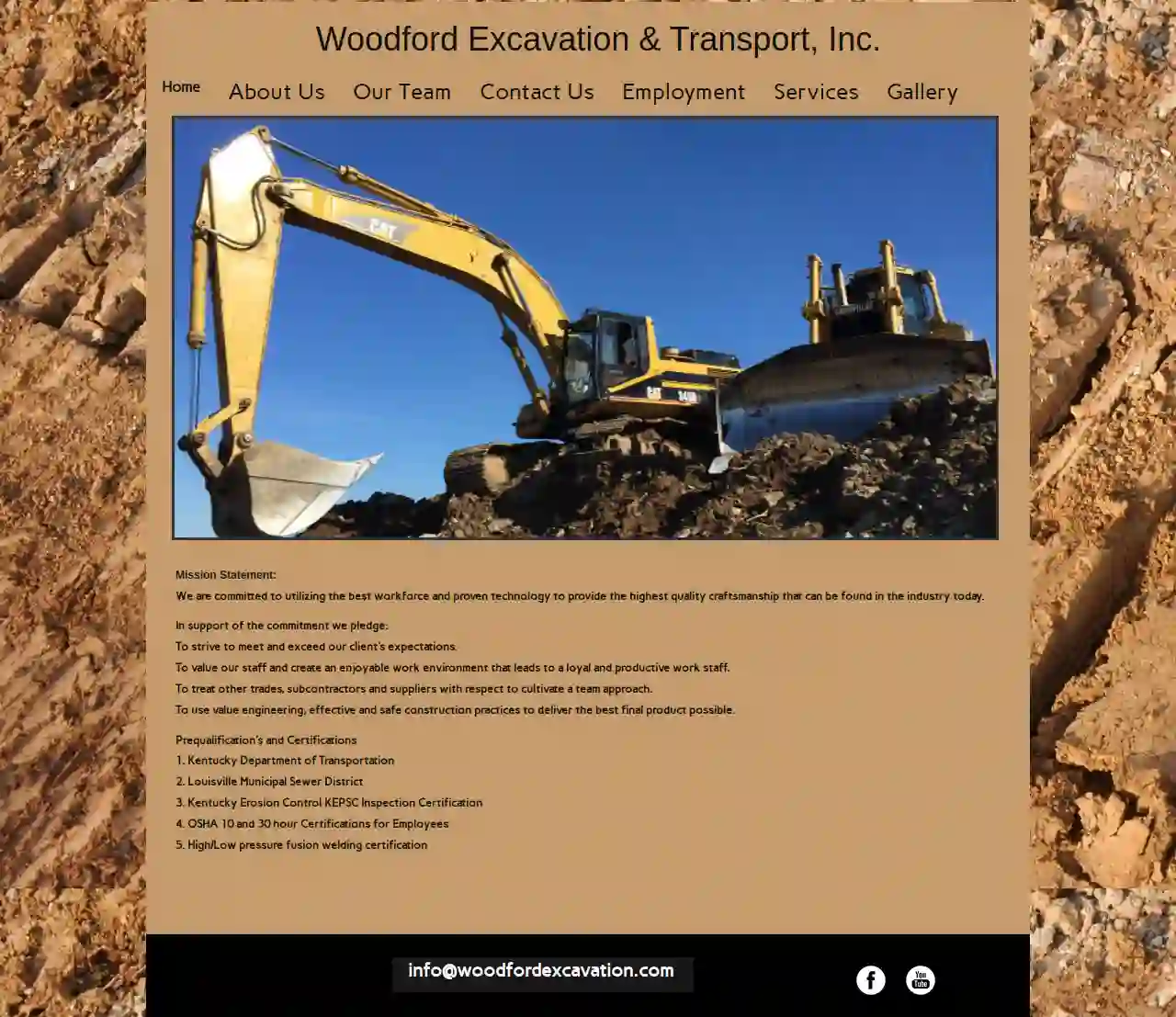
Woodford Excavation & Transportation Inc.
4.615 reviews310 Fielding Drive, 310 FIELDING DR., Versailles, 40383, USAbout Woodford Excavation & Transport Inc. Woodford Excavation & Transport Inc. is a Central Kentucky based business, specializing in site work and utility construction. Our goal is to provide the highest quality craftsmanship in the most cost effective and safest manner possible. Our team of highly qualified individuals have the proper training and experience to ensure projects are on schedule and up to date. With over 38 years' experience serving the Central Kentucky area, Woodford Excavation and Transport Inc., has built a solid reputation verified by exceptional quality, through knowledge, and the invaluable project solutions we have provided our clients. Our Mission We are committed to utilizing the best workforce and proven technology to provide the highest quality craftsmanship that can be found in the industry today. To strive to meet and exceed our client's expectations. To value our staff and create an enjoyable work environment that leads to a loyal and productive work staff. To treat other trades, subcontractors and suppliers with respect to cultivate a team approach. To use value engineering, effective and safe construction practices to deliver the best final product possible. Our Team Our team is comprised of experienced professionals who are dedicated to providing our clients with the highest quality service. We are committed to safety and quality, and we strive to exceed our clients' expectations on every project. Our Equipment We have over 60 pieces of equipment ranging from Cat 303 to Cat 345 excavators, Cat scrapers, Cat D5 to D8 Dozers, GPS and Laser Operated machines, articulated dump trucks, rubber tire backhoes, tracked loaders, compact track loaders motorgraders, compactors and rollers, and over the road dump trucks and tractor trailers.
- Services
- Why Us?
- Our Team
- Gallery
Get Quote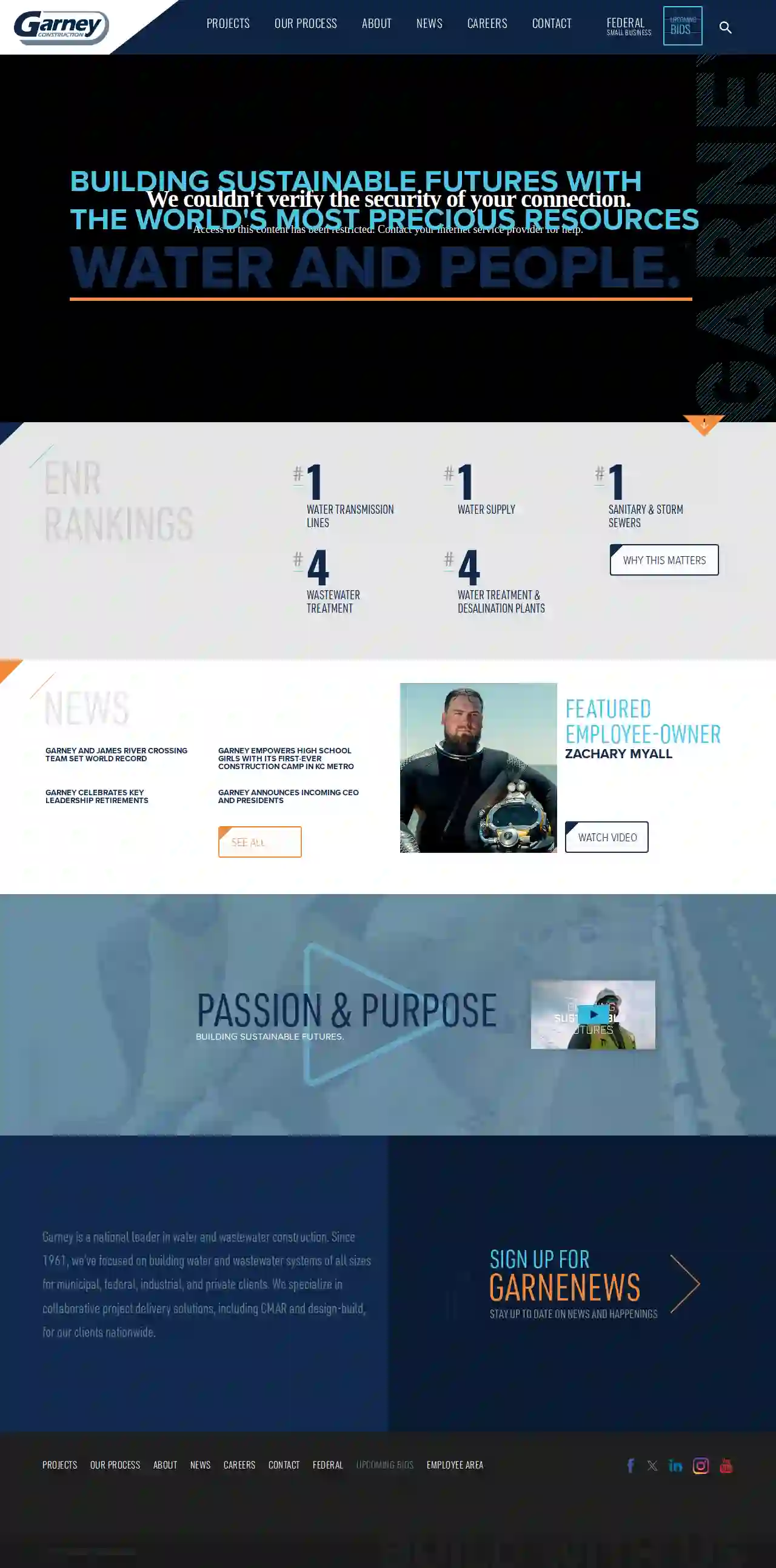
Garney Construction
51 reviewsLouisville, USBuilding sustainable futures with the world's most precious resources: Water and People.® Garney is a national leader in water and wastewater construction. Since 1961, we’ve focused on building water and wastewater systems of all sizes for municipal, federal, industrial, and private clients. We specialize in collaborative project delivery solutions, including CMAR and design-build, for our clients nationwide.
- Services
- Why Us?
- Gallery
Get Quote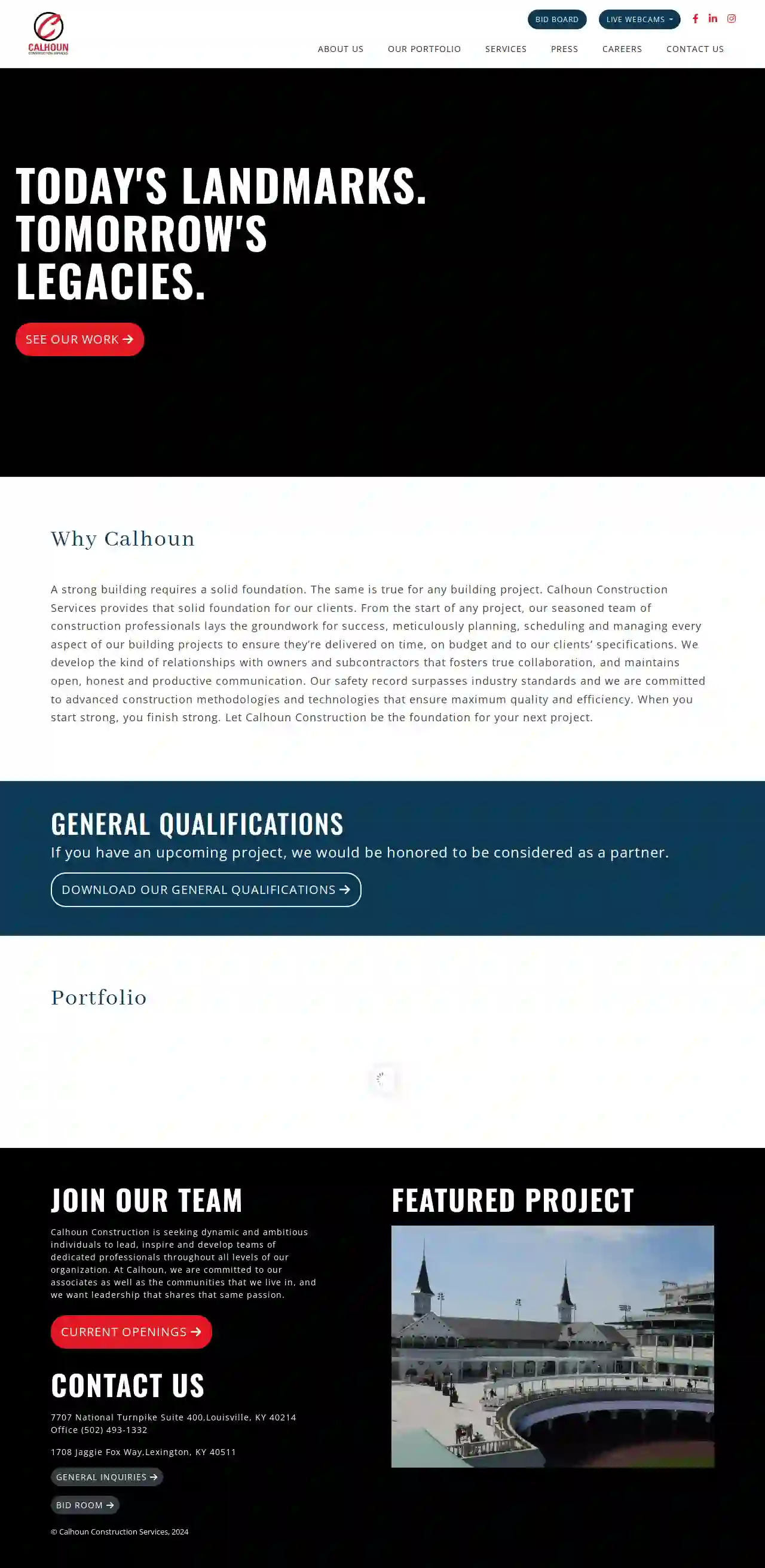
Calhoun Construction Services
7707 National Turnpike Suite 400, Louisville, 40214, USToday's landmarks. Tomorrow's legacies. A strong building requires a solid foundation. The same is true for any building project. Calhoun Construction Services provides that solid foundation for our clients. From the start of any project, our seasoned team of construction professionals lays the groundwork for success, meticulously planning, scheduling and managing every aspect of our building projects to ensure they’re delivered on time, on budget and to our clients’ specifications. We develop the kind of relationships with owners and subcontractors that fosters true collaboration, and maintains open, honest and productive communication. Our safety record surpasses industry standards and we are committed to advanced construction methodologies and technologies that ensure maximum quality and efficiency. When you start strong, you finish strong. Let Calhoun Construction be the foundation for your next project.
- Services
- Why Us?
- Gallery
Get Quote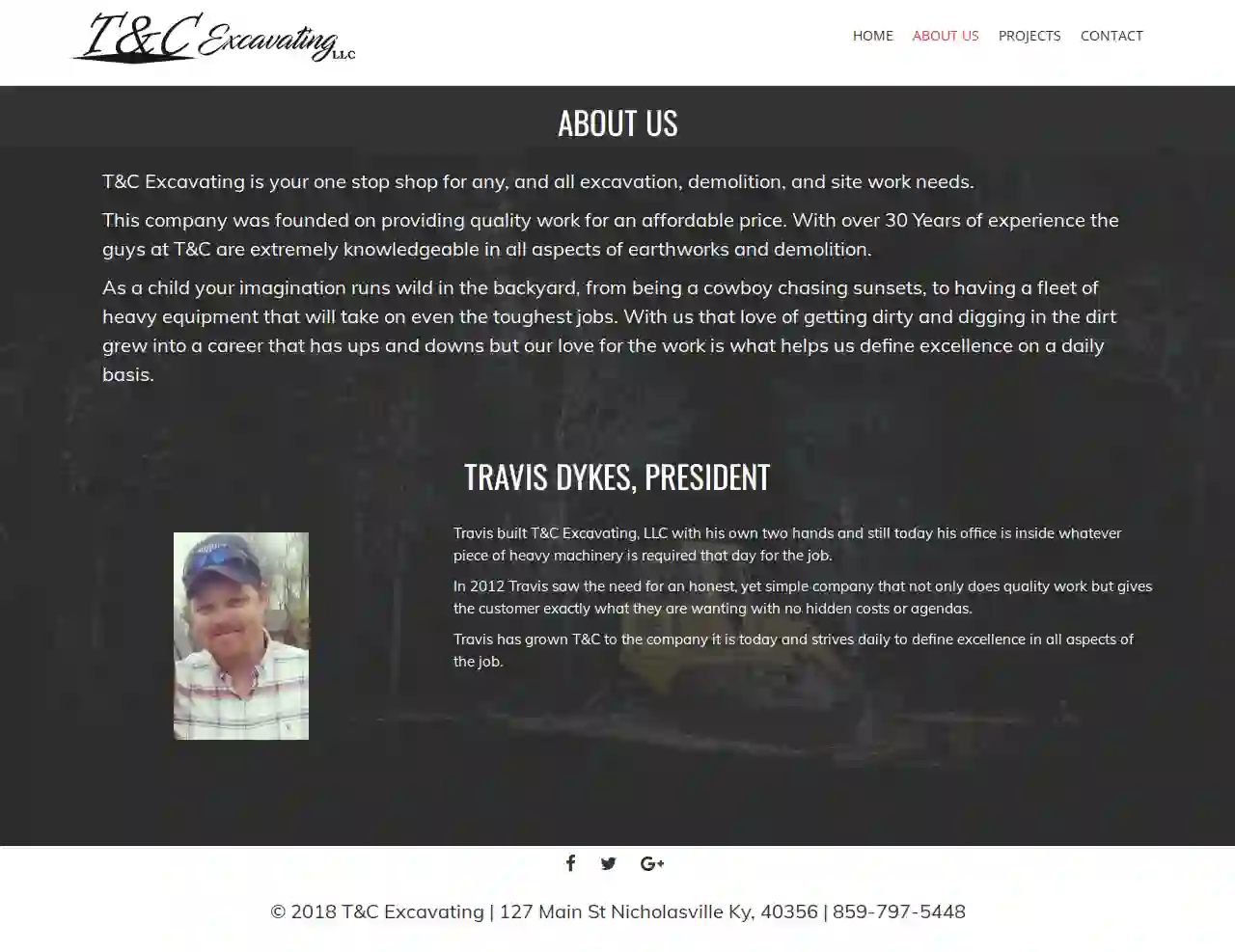
T&C Excavating
127 Main St, Nicholasville, 40356, USAbout T&C Excavating T&C Excavating is your one-stop shop for all your excavation, demolition, and site work needs. Founded on providing quality work at an affordable price, T&C boasts over 30 years of experience, making them experts in all aspects of earthworks and demolition. From humble beginnings, T&C's passion for digging and getting dirty has blossomed into a career defined by excellence. Their dedication to customer satisfaction and quality work is evident in every project they undertake. Travis Dykes, President Travis, the driving force behind T&C Excavating, built the company from the ground up. His office is often found inside the heavy machinery required for the day's job, demonstrating his hands-on approach and commitment to the work. In 2012, Travis recognized the need for an honest and straightforward company that delivers quality work without hidden costs or agendas. He has grown T&C into the reputable company it is today, constantly striving for excellence in every aspect of their operations.
- Services
- Why Us?
- Our Team
- Gallery
Get Quote
Shingleton Excavating, LLC
5098 Newtown Pike, 5098 Newtown Pike Lexington, KY, Lexington, 40511, USFull Service Excavation & Contracting from Start to Finish We are a full service excavating and contracting company offering a wide variety of construction related services. Being in the heart of Horse Country, we work with many farms to maintain, build and create working spaces for years to come. No Project is Too Small or Large We offer a wide variety of services. Everything from: Excavation, Laser Grading, Land Clearing & Tree Removal, Fill dirt/Create barn pads, Restore & build arenas, Clean out & Maintain Ponds, Road Installation, Water Lines & Horse Waters, Farm Renovations/Demolition. If we can't do it, we can find someone who can! Friendly & Experienced Shingleton Excavating, LLC has been serving central KY for over 20 years. Our experience and attention to detail are hallmarks of the company. We have an extensive inventory of equipment that allows us to complete nearly any job you may have. No project is too large or small. Give us a call today and see how our services can make your next improvement or new installation a quick and worry free endeavor. Leave it up to us! Our sister company, Equestrian Arena Services, assists our customers with leveling, creating and building out the perfect arena for all your horse-needs. We have been building arenas all over the US for more than 20 years & counting! Visit our website for more details and to check out our projects completed.
- Services
- Why Us?
- Testimonials
- Gallery
Get Quote
SGM Paving & Excavating
32 reviewsLexington, USWelcome to SGM Paving Serving your paving, excavating and concrete needs in the Bluegrass. Asphalt & Concrete Seal coating, Striping, Farm Roads, Parking Lots, Driveways, Subdivisions, Excavating, Complete Site Work Land Clearing & Site Prep Trees & Shrub removal, Rock Removal, Home Site Clearing, Utility Easements, Subdivisions, Site Clean Up Excavation & Grading Rough Grading, Finish Grading, Recompaction, Trenching, Backfill, Demolition What Our Clients Are Saying “I would like to take the time to commend SGM Excavating for the work performed at our Kellogg’s Pikeville plant. The communication and coordination to accomplish this project while the plant was still running was outstanding. I am looking forward to future projects and building a stronger working relationship with Shawn and his crew.” - David Roop Featured Work Kellogg’s Pikeville Plant Lake Mingo Quality Pavement
- Services
- Why Us?
- Our Team
- Testimonials
- Gallery
Get Quote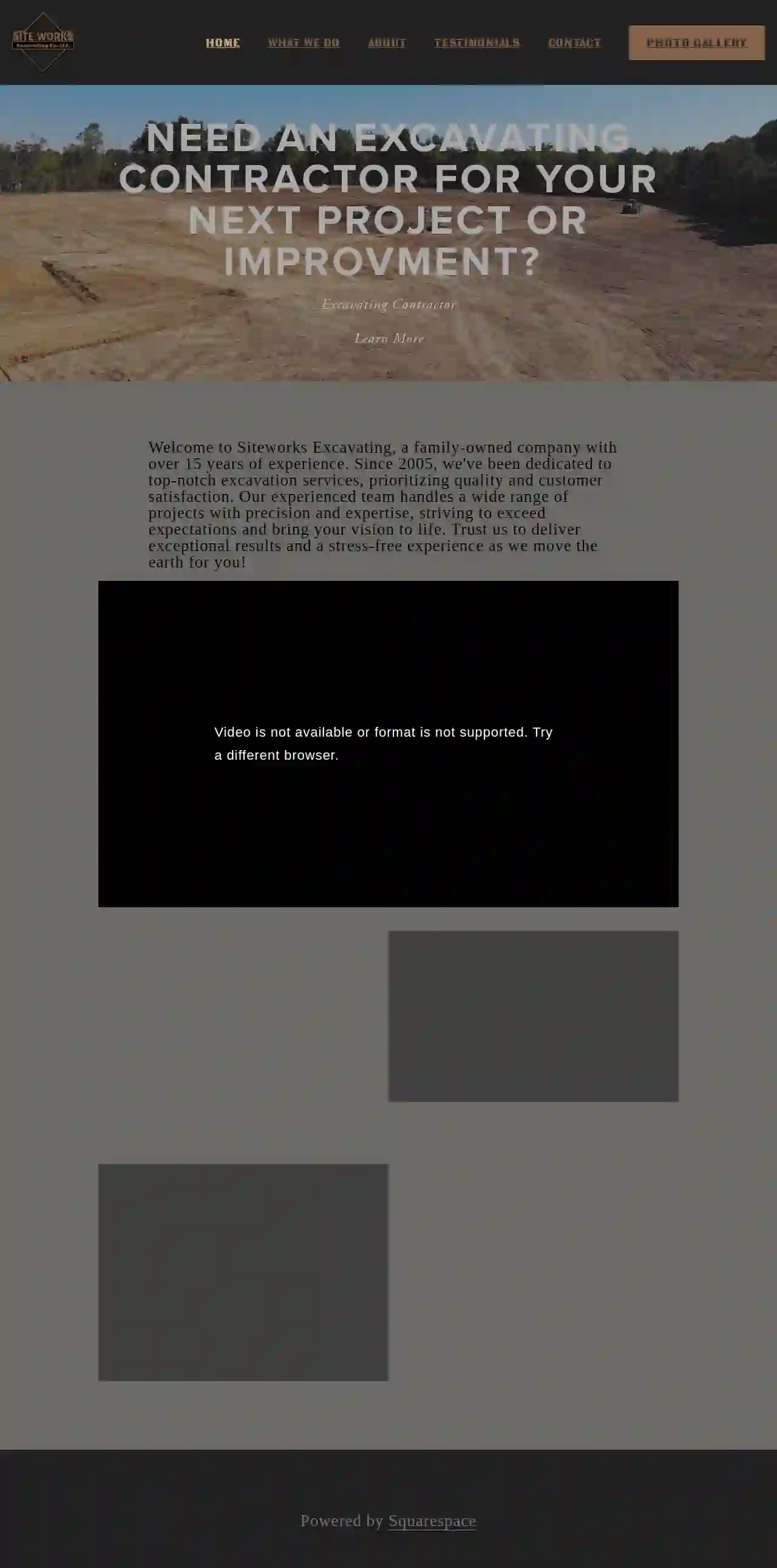
Site Works Excavating Co. LLC
511 reviewsLouisville, USWelcome to Siteworks Excavating Siteworks Excavating is a family-owned business with over 15 years of experience in Southern Indiana. We're dedicated to providing top-notch excavation services, prioritizing quality and customer satisfaction. Our experienced team handles a wide range of projects with precision and expertise, striving to exceed expectations and bring your vision to life. We believe in offering quality work done correctly and efficiently, the first time, while staying within budget and focusing on safety! Trust us to deliver exceptional results and a stress-free experience as we move the earth for you!
- Services
- Why Us?
- Our Team
- Gallery
Get Quote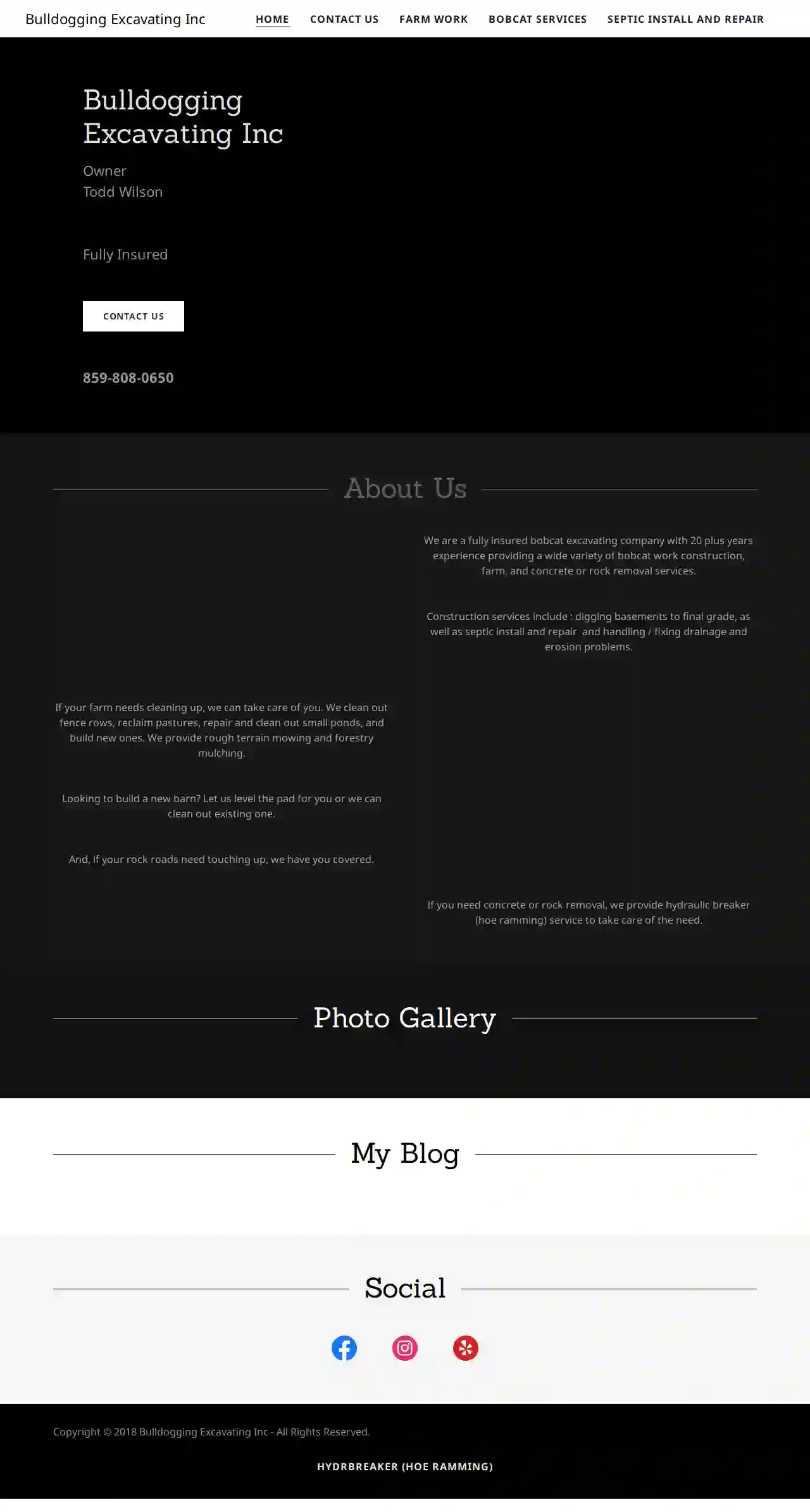
Bulldogging Excavating Inc.
Ecton Rd, Winchester, KY, 40391, USAbout Us We are a fully insured bobcat excavating company with 20 plus years experience providing a wide variety of bobcat work construction, farm, and concrete or rock removal services. Construction services include : digging basements to final grade, as well as septic install and repair and handling / fixing drainage and erosion problems. If your farm needs cleaning up, we can take care of you. We clean out fence rows, reclaim pastures, repair and clean out small ponds, and build new ones. We provide rough terrain mowing and forestry mulching. Looking to build a new barn? Let us level the pad for you or we can clean out existing one. And, if your rock roads need touching up, we have you covered. If you need concrete or rock removal, we provide hydraulic breaker (hoe ramming) service to take care of the need.
- Services
- Why Us?
- Our Team
- Gallery
Get Quote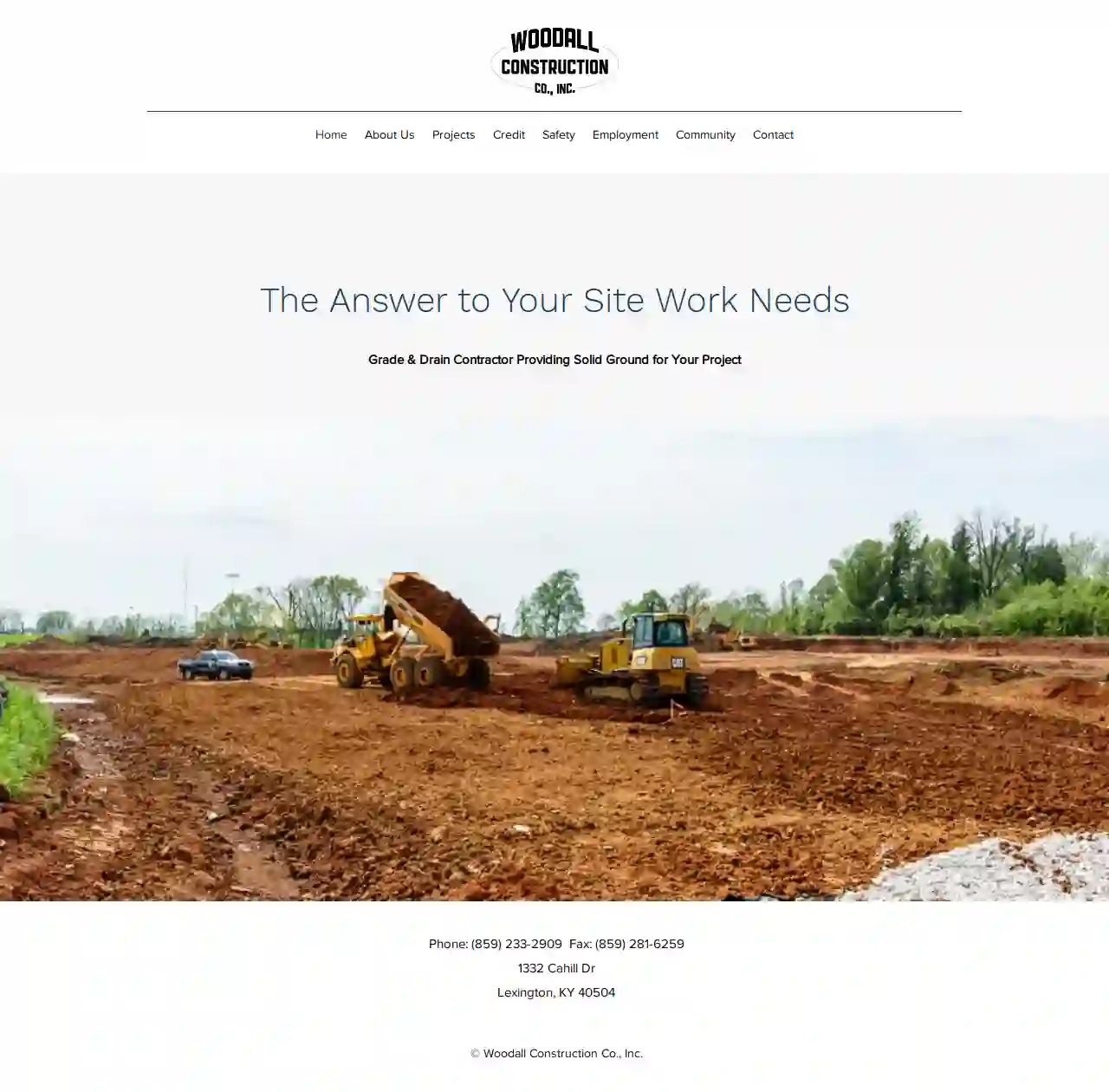
Woodall Construction Co Inc
3.77 reviews1332 Cahill Dr, Lexington, 40504, USWoodall Construction Co., Inc. is your trusted partner for all your site work needs. We are a grade & drain contractor with a proven track record of delivering high-quality projects on time and within budget. Our team of experienced professionals is dedicated to providing our clients with the best possible service. We are committed to safety, quality, and customer satisfaction. We offer a wide range of services, including: Grading Drainage Site preparation Utilities Paving And more We are proud to serve the Lexington, KY area. Contact us today to learn more about our services and how we can help you with your next project.
- Services
- Why Us?
- Gallery
Get Quote
SAJ Excavating
56 reviewsLexington, USRichmond's Premier Site Prep Contractor. SAJ Excavating is more than an excavation business; it's a testament to our core values of honesty, integrity, dependability, and clear communication. As a family-owned enterprise in Richmond, KY, led by a local firefighter, these values form the bedrock of our work ethos. Just as in firefighting, our commitment to excellence and safety extends to our excavation services. We bring the same dedication, teamwork, and reliability from the fire service to every project, ensuring transparent communication and delivering honest, dependable work. At SAJ Excavating, our mission is to uphold these principles, providing exceptional excavation services rooted in our firefighting background and core values. Our Story At SAJ Excavating, we take pride in being more than just a premier Excavating Company in Madison County—we're a family-run business fueled by passion and dedication. In the heart of this family-run venture, my wife, Jewely, plays a pivotal role in the back end of the company. Her commitment and expertise contribute significantly to our success, ensuring seamless operations and exceeding client expectations. As a local firefighter dedicated to serving our community, I bring the same level of commitment to SAJ Excavating, ensuring that each project reflects our unwavering dedication. Beyond the excavation business, we are deeply rooted in our community, and our mission is to go above and beyond for our clients. WHY US? At SAJ Excavating, we're your trusted excavation partner in Richmond, KY. Our commitment lies in delivering expert excavation services tailored to your unique needs. Honesty and fairness are at the core of our approach – expect transparent communication and upfront pricing. Our work is grounded in integrity, ensuring your project is handled with trustworthiness from start to finish. SAJ Excavating is your go-to solution for top-notch excavation services. Choose us for excellence with integrity, where your vision meets our expertise.
- Services
- Why Us?
- Testimonials
- Gallery
Get Quote
Over 22,076+ Excavation Contractors in our network
Our excavation experts operate in Fort Wright & beyond!
ExcavationHQ has curated and vetted the Best Excavation Pros arround Fort Wright. Find a trustworthy contractor today.
Frequently Asked Questions About Demolition Contractors
- Waste Generation: Demolition generates a large volume of debris, contributing to landfill space and potentially releasing harmful substances into the environment if not disposed of properly.
- Air Pollution: Dust and particulate matter released during demolition can impact air quality, affecting human health and the environment.
- Noise Pollution: Demolition activities can generate significant noise, disturbing nearby residents and wildlife.
- Resource Depletion: Demolition consumes resources that could be salvaged and reused, contributing to resource depletion and environmental degradation.
- Feasibility Studies: Assessing the viability and challenges of a demolition project.
- Demolition Planning: Developing demolition plans, including method selection, sequencing, and safety procedures.
- Permitting Assistance: Navigating the demolition permitting process and ensuring compliance with regulations.
- Hazardous Material Surveys: Identifying and managing hazardous materials, such as asbestos and lead paint.
- Cost Estimating: Providing accurate cost estimates for demolition services.
- Project Management: Overseeing the demolition process and ensuring it proceeds as planned.
- General Liability Insurance: Covers bodily injury or property damage to third parties caused by the contractor's negligence.
- Workers' Compensation Insurance: Provides benefits to workers injured on the job.
- Pollution Liability Insurance: Covers costs associated with environmental contamination caused by demolition activities.
- Professional Liability Insurance: Protects against claims of negligence or errors in professional services, such as demolition planning or consulting.
What are the environmental impacts of demolition?
What is the role of a demolition consultant?
How can I tell if my building contains asbestos?
What is the importance of insurance in demolition projects?
What are the environmental impacts of demolition?
- Waste Generation: Demolition generates a large volume of debris, contributing to landfill space and potentially releasing harmful substances into the environment if not disposed of properly.
- Air Pollution: Dust and particulate matter released during demolition can impact air quality, affecting human health and the environment.
- Noise Pollution: Demolition activities can generate significant noise, disturbing nearby residents and wildlife.
- Resource Depletion: Demolition consumes resources that could be salvaged and reused, contributing to resource depletion and environmental degradation.
What is the role of a demolition consultant?
- Feasibility Studies: Assessing the viability and challenges of a demolition project.
- Demolition Planning: Developing demolition plans, including method selection, sequencing, and safety procedures.
- Permitting Assistance: Navigating the demolition permitting process and ensuring compliance with regulations.
- Hazardous Material Surveys: Identifying and managing hazardous materials, such as asbestos and lead paint.
- Cost Estimating: Providing accurate cost estimates for demolition services.
- Project Management: Overseeing the demolition process and ensuring it proceeds as planned.
How can I tell if my building contains asbestos?
What is the importance of insurance in demolition projects?
- General Liability Insurance: Covers bodily injury or property damage to third parties caused by the contractor's negligence.
- Workers' Compensation Insurance: Provides benefits to workers injured on the job.
- Pollution Liability Insurance: Covers costs associated with environmental contamination caused by demolition activities.
- Professional Liability Insurance: Protects against claims of negligence or errors in professional services, such as demolition planning or consulting.